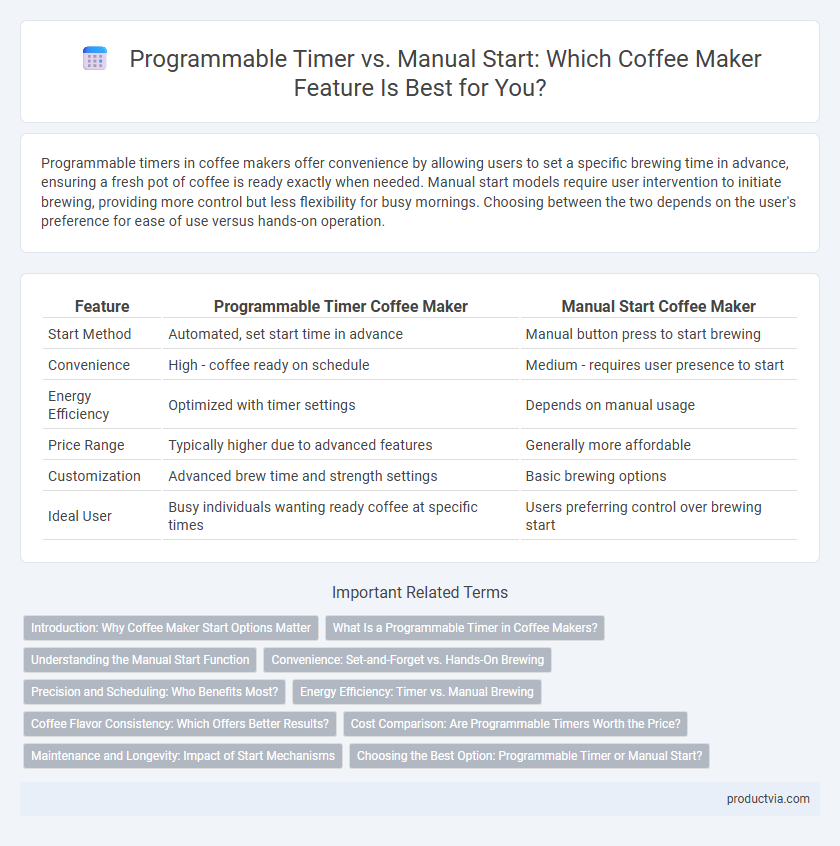Programmable timers in coffee makers offer convenience by allowing users to set a specific brewing time in advance, ensuring a fresh pot of coffee is ready exactly when needed. Manual start models require user intervention to initiate brewing, providing more control but less flexibility for busy mornings. Choosing between the two depends on the user's preference for ease of use versus hands-on operation.
Table of Comparison
| Feature | Programmable Timer Coffee Maker | Manual Start Coffee Maker |
|---|---|---|
| Start Method | Automated, set start time in advance | Manual button press to start brewing |
| Convenience | High - coffee ready on schedule | Medium - requires user presence to start |
| Energy Efficiency | Optimized with timer settings | Depends on manual usage |
| Price Range | Typically higher due to advanced features | Generally more affordable |
| Customization | Advanced brew time and strength settings | Basic brewing options |
| Ideal User | Busy individuals wanting ready coffee at specific times | Users preferring control over brewing start |
Introduction: Why Coffee Maker Start Options Matter
Choosing between a programmable timer and manual start for coffee makers directly impacts convenience and brewing precision. Programmable timers allow users to set exact brewing times, ensuring fresh coffee is ready upon waking, which enhances daily routines. Manual start requires active engagement but offers flexibility to brew only when desired, catering to varying schedules and preferences.
What Is a Programmable Timer in Coffee Makers?
A programmable timer in coffee makers allows users to set a specific brewing time in advance, ensuring fresh coffee is ready exactly when desired. This feature uses an internal clock and digital interface to automate the start process, eliminating the need for manual activation. It enhances convenience and consistency by delivering freshly brewed coffee at predetermined times without user intervention.
Understanding the Manual Start Function
The manual start function on coffee makers allows users to control brewing by initiating the process at any desired moment, offering flexibility without requiring pre-set times. Unlike programmable timers that automatically begin brewing based on scheduled settings, manual start ensures fresh coffee is brewed on demand, reducing the risk of stale taste. This feature is ideal for individuals with unpredictable routines or those who prefer immediate coffee preparation without advance programming.
Convenience: Set-and-Forget vs. Hands-On Brewing
Programmable timer coffee makers offer unmatched convenience by allowing users to set brewing times in advance, enabling fresh coffee ready upon waking or return home. Manual start models require user presence to initiate brewing, which limits flexibility and timely preparation. For those prioritizing a set-and-forget experience, programmable timers significantly enhance morning routines by automating coffee preparation without daily intervention.
Precision and Scheduling: Who Benefits Most?
Programmable timer coffee makers offer precise control over brewing start times, allowing users to schedule coffee preparation down to the minute for consistent daily routines. Manual start models require user intervention each time, limiting precision and convenience in scheduling. Busy professionals and early risers benefit most from programmable timers due to their reliable automation and time management advantages.
Energy Efficiency: Timer vs. Manual Brewing
Programmable timer coffee makers optimize energy efficiency by allowing users to set brewing times in advance, reducing wasted electricity during idle periods. Manual start models often consume more energy due to longer heating cycles and inconsistent usage patterns. Choosing a programmable timer coffee maker helps minimize energy consumption and supports sustainable brewing practices.
Coffee Flavor Consistency: Which Offers Better Results?
Programmable timer coffee makers ensure coffee flavor consistency by starting the brewing process at a precise time, preserving optimal extraction and temperature stability. Manual start models may introduce variability due to delayed or inconsistent brewing times, impacting flavor balance and aroma intensity. Consistent timing in programmable timers delivers a more reliable and uniform coffee taste compared to manual start counterparts.
Cost Comparison: Are Programmable Timers Worth the Price?
Programmable coffee makers typically cost 20-40% more than manual start models due to advanced features like automatic brewing schedules and delayed start options. While the initial investment is higher, these timers offer convenience and time savings that can justify the price for daily coffee drinkers. Manual coffee makers are more budget-friendly but require attention to start brewing, making them suitable for those who prefer simplicity over extra functionality.
Maintenance and Longevity: Impact of Start Mechanisms
Programmable timers in coffee makers contribute to consistent usage patterns, reducing wear on internal components and extending machine longevity by automating startup and minimizing human error. Manual start mechanisms may increase wear due to inconsistent operation, but they allow immediate control, potentially leading to more frequent cleaning and maintenance by attentive users. Overall, programmable start systems optimize maintenance schedules and enhance durability by ensuring timely operation and reducing unnecessary strain on the brewer.
Choosing the Best Option: Programmable Timer or Manual Start?
A programmable timer in coffee makers allows users to set brewing times in advance, ensuring fresh coffee is ready at the desired hour and offering convenience for busy mornings. Manual start models require users to activate brewing each time, providing more control over freshness but less automation. Choosing between a programmable timer and manual start depends on prioritizing convenience and automation versus hands-on control and immediate brewing preferences.
Programmable timer vs Manual start for coffee makers Infographic

 productvia.com
productvia.com